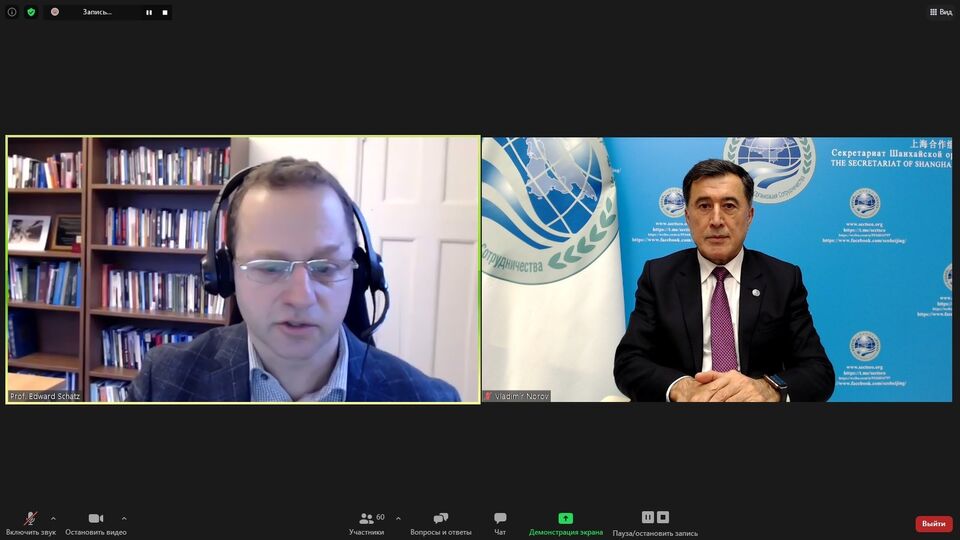On 12 January 2021, the SCO Secretariat and the University of Toronto held an online conference SCO and the New Multipolar World.
The event was attended by 75 academics from China, Singapore and other Eurasian countries and was moderated by Edward Schatz, an Associate Professor of Political Science at the University of Toronto and Acting Director of the Centre for European, Russian and Eurasian Studies (CERES) at the Munk School of Global Affairs and Public Policy.
SCO Secretary-General Vladimir Norov spoke about the role and place of the Shanghai Cooperation Organisation in the new multipolar world. He pointed out that the world was in the process of a deep transformation, which has been compounded by the Covid-19 pandemic and increasing global threats and challenges. He believes that this calls for the coordination of collective approaches and an acceptance of the fact that no country can ensure its security at the expense of others' security. "It is imperative in this situation for all countries to respect the universal principles of equal and indivisible security, which are equally applicable in the Euro-Atlantic, Eurasian and Asia Pacific regions. The focus is currently shifting to the importance of creating a universal, comprehensive and transparent architecture of reliable security and sustainable growth based on the priority of international law and equal and mutually beneficial cooperation," the SCO Secretary-General noted.
The interaction of multilateral organisations and regional associations, including the SCO, is of great significance in this context. Vladimir Norov pointed out that during the nearly 20 years since its establishment the SCO had become an effective format of multilateral interaction based on the political trust, mutually beneficial cooperation and harmonious coexistence of widely different cultures and civilisations, as well as the world's first example of equal partnership between culturally and civilisationally diverse states of different size, economic weight and political potential.
The SCO Secretary-General spoke in detail about the SCO's current activities, events held to uphold security and stability, and its efforts against drug trafficking.
Vladimir Norov emphasised the SCO countries' economic cooperation, including with regard to post-pandemic rehabilitation. He told the participants about the documents adopted following the SCO Summit in November 2020, in particular, the Comprehensive Plan for the SCO Member States' Joint Measures to Counteract Epidemic Threats in the Region, and the Plan of Action for 2021-2025 to implement the SCO Development Strategy until 2025. He added that the SCO would continue working to mitigate and overcome the socioeconomic impact of the current crisis on the basis of a plan of priority measures that is being coordinated.
The further development of the SCO's economic potential largely depends on expanding its transport infrastructure and logistical interaction, including in the framework of the alignment of the Belt and Road Initiative with the Eurasian Economic
Union and other multilateral and national development strategies, as well as on supporting the travel industry, which has been seriously damaged by the pandemic.
In this connection, Vladimir Norov mentioned the initiative of Tajikistan, which currently holds the rotating SCO Chairmanship, to organise the first SCO Tourism Forum in 2021. He added that 2021 had been declared the SCO Year of Culture, during which some events would be held to promote dialogue between civilisations and strengthen the Shanghai Spirit.
In conclusion of his address, the SCO Secretary-General informed the audience about the SCO countries' fight against COVID-19. He mentioned the approval of the Comprehensive Plan to Counteract Epidemics, which stipulates joint research projects and the creation of vaccines and effective treatment methods, and he spoke in favour of promoting cooperation in the fields of telemedicine, traditional medicine, online learning and e-commerce.
Vladimir Norov also answered questions, including about the SCO's relations with other international and regional organisations, the development of cooperation between SCO member states, and the potential spheres of cooperation between the SCO and Canada.
SCO Secretary-General Vladimir Norov addressing the SCO and the New Multipolar World videoconference
Answers and questions during the conference:
